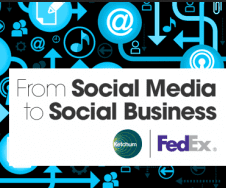 Can you remember what life was like before you discovered social media? It’s hard to believe how much of an impact something that I first began using only five years ago has made on the lives of billions of people. This new type of media has influenced so many aspects our society, including the way we do business.
Can you remember what life was like before you discovered social media? It’s hard to believe how much of an impact something that I first began using only five years ago has made on the lives of billions of people. This new type of media has influenced so many aspects our society, including the way we do business.
In 2010, FedEx and Ketchum set out to gather best practices about digital and social media from leading companies across a variety of industries. You can explore the study’s findings here.
Because the social media landscape has changed so drastically from 2010, this year we decided to conduct a follow up study, the 2012 FedEx/Ketchum Social Business Study, focusing on social business – leveraging social tools, technologies and strategies that transform the way enterprises interact with internal and external stakeholders to generate co-created value, I was amazed to discover the breadth of change in companies’ approach to “going social” inside and outside organizations. So what are some of the things that have changed over the last two years?
The Evolving Consumer
During an internship at NBC Universal a few years ago, I first heard about the concept of Social Television from industry leaders in the digital space. I remember thinking, “why would I want to watch television and write about it at the same time?” This is becoming more and more the norm as a new type of consumer is evolving – “The Connected Consumer” — one, that fully integrates social media into their lives and, as a result, finds and shares information differently than more traditional types of consumers.
As consumers evolve, it makes sense for businesses to also evolve in their use of social media to meet these consumers where they are. Our latest research shows that companies are becoming more focused on engaging with and developing relationships with consumers and stakeholders, shifting their social strategies to focus on fostering collaboration, dialogue and discussion. For more details about this shift click here.
The B2B Advance
As compared with the 2010 study, we were delighted to learn about how B2B companies have also evolved into social businesses in two years’ time (the study includes three case studies of B2B companies who are doing a great job in this realm – Aon, SAS and Xerox). Charlene Li, Founder Partner at Altimeter, notes that B2B companies need to work harder to build relationships and, therefore, have an inclination to leverage social business for that purpose. For more details about this B2B advance, click here.
Evolution in Leaders’ Mindset
A lot of the conversations that we had with companies in 2010 were about getting leadership to buy in to the whole notion of companies using social media. This year’s study reveals that this has become a non-issue for many companies as their leaders already understand that they must “go social” to remain competitive. This enables social media experts to focus on their actual strategies, instead of trying to convince leadership about the benefits of being social. Peter Osborne, Communications Executive at Bank of America went so far as to tell us that “Bank of America wouldn’t have been this active in social business if it wasn’t for the company’s executives. Social media is now an everyday part of the conversation.”
Is Transparency the Best Policy?
While leadership buy-in is definitely a step forward, many companies are still very cautious about their social presence. In the 2010 study, participants repeatedly stressed the necessity for transparency and authenticity in every social media program; however, we were surprised to learn that 27% of participating companies are actually more concerned with transparency than before. The heightened concerns over transparency could be a result of the increasingly complex social environment, including issues of employee privacy, ownership of content, the difficulty of organizations to keep information within their firewalls or just seeing how websites like WikiLeaks brought countries to the verge of a political crisis. Mike Fernandez, Corporate Vice President at Cargill said: “In a world where nothing can be hidden, you better have nothing to hide.”
To learn more about these topics, check out our MMR. Stay tuned for future posts highlighting our additional findings.
Want to Learn More?
Click here to sign up for a free webinar about the 2012 FedEx / Ketchum Social Business Study on Aug 7 11-12 pm


